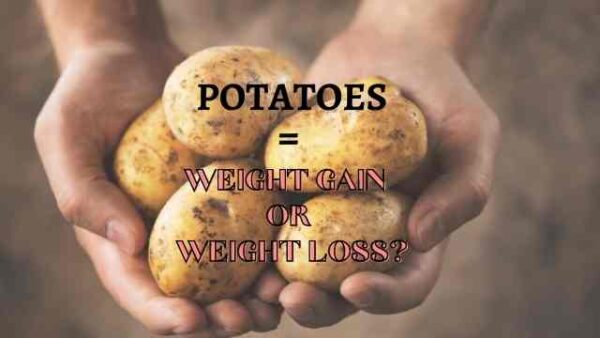When it comes to weight management, many foods have received unfair reputations over the years. One such food is the humble potato. In this blog post, we’ll explore the truth about potatoes and their potential impact on weight gain. Potatoes have been widely misunderstood and labeled as “fattening” or a cause of weight gain. However, it’s essential to look beyond the myths and examine the actual nutritional content and science behind potatoes.
Understanding the Nutritional Value of Potatoes
Potatoes are a staple crop consumed by people worldwide due to their versatility and delicious taste. They come in various forms, including russet, red, yellow, and sweet potatoes, each offering unique nutritional benefits. One medium-sized potato (about 150 grams) contains approximately 110 calories, virtually no fat, zero cholesterol, and is a rich source of essential nutrients.
- Complex Carbohydrates: The primary component of potatoes is carbohydrates. Nonetheless, they consist mainly of intricate carbohydrates that undergo gradual digestion, offering a prolonged and consistent supply of energy. This means that potatoes can help you feel full and satisfied for longer, potentially reducing overall caloric intake.
- Dietary Fiber: Potatoes are an excellent source of dietary fiber, promoting a healthy digestive system and aiding in weight management. Fiber helps control hunger by slowing down digestion and preventing blood sugar spikes, which can contribute to cravings and overeating.
- Vitamins and Minerals: Packed with vital vitamins and minerals like potassium, vitamin C, vitamin B6, and manganese, potatoes play a crucial role in supporting overall health. Adequate nourishment enhances the body’s ability to effectively manage weight.
The Glycemic Index (GI) and Weight Management
One factor often associated with potatoes and weight gain is the Glycemic Index (GI). The GI is a ranking system that measures how quickly carbohydrates in foods raise blood sugar levels. Foods with a high glycemic index lead to swift increases in blood sugar levels, leading to a subsequent crash, potentially triggering hunger and overeating.
Potatoes have been categorized as a high-GI food, leading to the misconception that they promote weight gain. However, the GI of potatoes can vary depending on several factors, including cooking methods and the type of potato consumed. For example, boiled or baked potatoes have a lower GI compared to fried ones. Additionally, combining potatoes with protein or fiber-rich foods can help offset the impact of their GI on blood sugar levels.
Moderation and Portion Control are Key
Like any food; the moderation and portion control are vital when consuming potatoes. Eating potatoes in reasonable portions Incorporating it into a well-rounded eating plan is improbable to lead to an increase in body weight, emphasizing the need to take the complete situation into account.
Moreover, the way potatoes are prepared can significantly influence their impact on weight. Opt for healthier cooking methods like boiling, baking, or roasting, and avoid deep-frying, which adds unnecessary calories from oil.
Incorporating Potatoes into a Healthy Diet
Potatoes can undoubtedly be a part of a healthy diet when consumed mindfully. Here are some tips to incorporate potatoes into your meals without worrying about weight gain:
- Balanced Meals: Combine potatoes with lean proteins, healthy fats, and a variety of vegetables to create balanced and nutritious meals. This approach ensures you get the necessary nutrients while controlling calorie intake.
- Be Creative: Explore various cooking methods and seasoning options to enhance the flavor of potatoes without resorting to excessive butter, cheese, or salt. Experiment with herbs and spices to create tasty, low-calorie dishes.
- Mindful Eating: Be mindful of portion sizes and adopt a slow eating pace. Give your body time to recognize that it’s full, preventing overeating.
What Happens if You Eat Potatoes Everyday?
May result in both beneficial and adverse impacts on your well-being depending on various factors such as the type of potatoes consumed, preparation methods, portion sizes, and the overall context of your diet. Listed below are the potential outcomes of including potatoes in your daily diet:
Positive Effects
- Nutrient Intake: Potatoes are a good source of essential nutrients such as vitamins (vitamin C, vitamin B6), minerals (potassium, manganese), and dietary fiber. Incorporating them into your daily diet can contribute to meeting your nutritional needs.
- Satiety: Potatoes are rich in complex carbohydrates and dietary fiber, which can contribute to a sense of fullness and satisfaction. This feeling of fullness may prevent overeating and may be beneficial for weight management.
- Digestive Health: The fiber content in potatoes supports healthy digestion, helps prevent constipation, and fosters a healthy gut environment.
- Energy Source: The carbohydrates in potatoes provide a steady source of energy, which can be beneficial for individuals engaged in physical activities or those with high energy demands.
Negative Effects
- Weight Gain: While potatoes themselves are not inherently fattening, consuming them in excessive quantities or preparing them with unhealthy cooking methods (e.g., deep-frying) can contribute to weight gain due to increased calorie intake.
- Blood Sugar Spikes: Potatoes have a relatively high glycemic index (GI), meaning they can cause sharp increases in blood sugar levels upon consumption in significant quantities or without other foods that slow digestion. Individuals with diabetes or insulin resistance may find this problematic.
- Nutrient Imbalance: Relying heavily on potatoes as a primary food source might lead to nutrient imbalances, as they do not provide all the essential nutrients required for a well-rounded diet.
- Acrylamide Formation: When subjected to elevated temperatures, potatoes undergo cooking (e.g., frying, baking), they can form acrylamide, a potentially harmful substance that may be linked to a heightened susceptibility to specific health concerns.
- Pesticide Exposure: Conventionally grown potatoes can be high in pesticide residues. Eating them daily without opting for organic options may increase your exposure to these chemicals.
- Allergies and Sensitivities: Certain people might have allergies to potatoes or have sensitivities to certain compounds found in them, leading to adverse reactions.
Recommendations
If you want to include potatoes in your daily diet, consider the following tips:
- Diversify Your Diet: Don’t rely solely on potatoes as your main carbohydrate source. Include an assortment of veggies, fruits, and whole grains, and lean proteins to ensure you receive a wide array of nutrients.
- Choose Healthy Cooking Methods: Opt for boiling, baking, or roasting potatoes with minimal added fats and avoid deep-frying to reduce calorie intake and acrylamide formation.
- Mind Portion Sizes: Be mindful of portion control when eating potatoes. Stick to reasonable serving sizes to avoid excessive calorie consumption.
- Monitor Blood Sugar Levels: In the event that you are afflicted with diabetes, or other blood sugar-related issues, be cautious about potato consumption and monitor your blood glucose levels accordingly.
- Consider Organic Options: If possible, choose organic potatoes to minimize pesticide exposure.
- Listen to Your Body: Pay attention to how your body responds to eating potatoes daily. If you notice any adverse effects or sensitivities, consider reducing your consumption or seeking medical advice.
In conclusion, the notion that potatoes inevitably lead to weight gain is a myth. Potatoes, when prepared and consumed in moderation, can be an essential component of a well-rounded and nutritious eating plan. Their complex carbohydrates, dietary fiber, and valuable nutrients make them a valuable addition to any meal plan. Remember that overall lifestyle choices, including physical activity, play a significant role in weight management.
Read: Health Benefits of Ginger and Garlic
As with any dietary concern, It’s advisable to seek guidance from a certified healthcare practitioner or nutrition expert to tailor a diet that suits your individual needs and health goals. Embrace the goodness of potatoes and enjoy them guilt-free as part of a wholesome and varied diet.
Read also: Foods that Enhance Healthy Hair, and Skin




